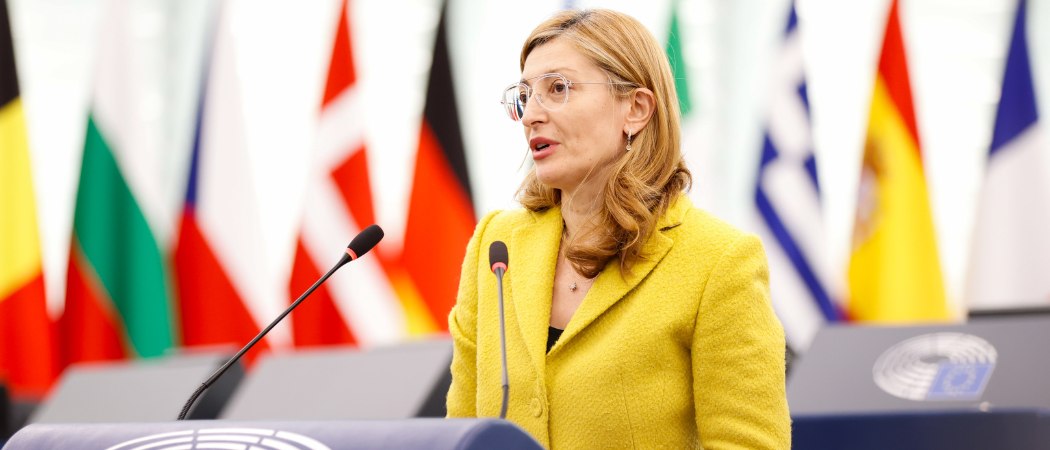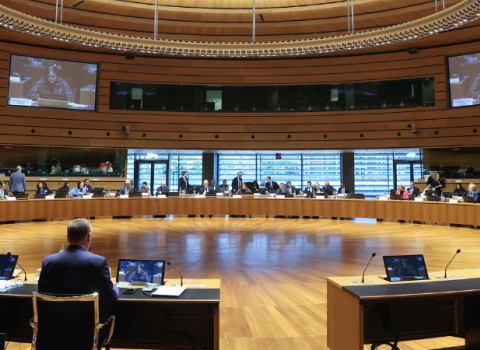Regulations will be streamlined, access to capital eased and working conditions improved, the research commissioner tells MEPs

Ekaterina Zaharieva, the new commissioner for Start-ups, Research and Innovation, presenting plans for a European Innovation Act at the Parliament. Photo credits: Mathieu Cugnot / European Union
The European Parliament has welcomed plans laid out by the new research commissioner Ekaterina Zaharieva for a European Innovation Act.
“As the Draghi report has highlighted, Europe is failing to translate innovation into commercialisation,” Zaharieva told MEPs, setting out the plans, which will now be open to public consultation.
The Act will “simplify and streamline our regulatory framework, facilitate access to venture capital and support the testing of new solutions and technologies,” Zaharieva said.
“By simplifying our regulatory framework, we can reduce the barriers to entry for new businesses, making it easier for them to innovate, grow and create jobs. By enhancing access to funding and investment opportunities, we can ensure that start-ups and scale-ups have the resources they need to develop and commercialise the ideas here in the EU,” she added.
An Innovation Act has been under discussion for 15 years in a bid to reinforce the EU’s competitiveness, and is finally taking shape as part of the new Commission’s push to close the innovation gap with the US and China.
Zaharieva wants the Act to focus on existing but underutilised and fragmented tools, and to give innovators “more certainty.” She cited as an example regulatory sandboxes, which help companies test their products in market conditions. “We must also look at other regulations that could be more unified across the EU,” she explained.
MEPs agreed on the need to cut red tape. “The EU has all it needs to be innovative: it has good technical universities, it has industry and capital, but our position in the global digital economy is weak,” said Kosma Złotowski, of the European Conservatives and Reformists Group, in response to the commissioner’s speech.
“Our regulation policy is one of the reasons we have complex regulations, administrative barriers, unclear processes, and this makes innovation simply economically unviable in Europe,” he added.
More private capital
Within the scope of the Act, Zaharieva hopes to “tackle our underdeveloped EU financial market by mobilising more private capital. The 27-member bloc accounts for just 5% of venture capital funds raised, against 52% in the US and 40% in China, she noted.
“The added value of pulling in resources for innovation at the EU level is strong,” Zaharieva said. “Every euro invested by the European Innovation Council (EIC) crowds in over €4 of additional investment into these tech start-ups and SMEs.”
MEPs also confirmed the importance of increasing both public and private investment in start-ups.
“We need support through the public purse, but we need venture capital and strategic investments, The EU needs to become more attractive for international investments,” said Hildegard Bentele, of the European People’s Party. “To do that, we need to breakdown the final borders of the capital markets of the [EU].”
Better research careers
Thirdly, a European Innovation Act would aim at reducing precarity and improving the working conditions for researchers. “Growth depends significantly on the ability to attract and retain talent,” Zaharieva said. “The attractiveness of the EU as a place for talent depends on the resources we can offer to innovators, not only venture capital, but also hard and soft infrastructure.”
Finally, the research commissioner called for further simplification of the EU framework programmes, a common thread in all her speeches to date, and for better coordination to support Europe’s competitiveness. “More alignment in the years to come will be key,” she said.
Damian Boeselager, of the Greens-European Free Alliance, urged Zaharieva to not make the European Innovation Act a part in the Commission’s programme, but to include it as a core piece of the EU’s Clean Industrial Deal.





 A unique international forum for public research organisations and companies to connect their external engagement with strategic interests around their R&D system.
A unique international forum for public research organisations and companies to connect their external engagement with strategic interests around their R&D system.